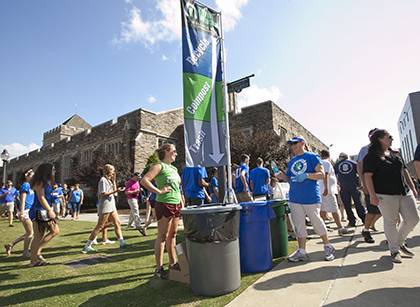Help Make Duke Football #1 in Sustainability
Three games left to become first ACC school with ‘zero waste’ game day

With three home games remaining, Duke is still seeking to become the first university in its conference to make football game days a “zero waste” event through recycling and composting waste.
To obtain the mark at each game, 90 percent of compost and recyclable material must be diverted from trash, according to national guidelines.
In four home games this season, the highest diversion rate reached was 55 percent for a Sept. 13 game against University of Kansas. Since the effort started at the beginning of the season, the average diversion rate for home games has been 46 percent – about half of what it needs to be.
The three final games to achieve zero waste status take place against Virginia Tech this Saturday, Nov. 20 against University of North Carolina-Chapel Hill and Nov. 29 versus Wake Forest.
“If you show people how to recycle or compost once, chances are they’ll be aware next time they come back and a lot less stuff is going into the landfill,” said Kurt Meletzke, program coordinator with the Duke Center for International Development. He’s volunteered at three home games to help with the zero waste effort. “I’ve started to see people reach back into the garbage can if they made a mistake and you don’t see that often.”
At each home game, special zero waste stations are set up throughout the Wallace Wade Stadium concourse and Blue Devil Alley. Bag stations are available in parking lots for fans to pick up bags for trash, recyclables and materials for composting. Student and employee volunteers are also at stations inside Wallace Wade, where they help direct fans on how to properly dispose of food scraps, trash and recyclable materials.
Each piece of waste goes in a specific three-feet tall, circular bin that’s color-coordinated for each kind of waste: trash like wrappers and Styrofoam (gray), compost like food scraps and paper products (green) and recycling like aluminum and plastic (blue).
Arwen Buchholz, Duke's recycling and waste reduction coordinator, said that she’s impressed with the 17,460 pounds of recycling and 2,830 pounds of compost collected at Duke’s four home games, but the number could still grow, she added.
Buchholz said one important step is making sure fans put all recyclable into recycling bins and all food and paper products in compost bins, otherwise materials may be too “contaminated” to be composted.
In addition to the stadium concourse, recycling and waste bag stations are setup in tailgating areas near portable toilets to make the entire game day zero waste. Fans in tailgate areas can properly dispose of items in marked bags: black for trash, blue for recycling and green for compost.
“Our volunteers have done a wonderful job sorting contaminants from the recycling, compost and trash, but our biggest challenge remains educating fans to appropriately dispose of waste while tailgating,” Buchholz said. “We hope fans will take a quick moment to review what goes in the bags provided during tailgating to help us reach our goal.”